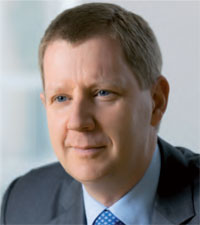John Pennink, fund manager at British Empire Securities, searches for value in today’s fearful markets
John Pennink, the manager of British Empire Securities, a £725 mn ($1.13 bn) international equity fund, smells fear in the markets. Companies in his portfolio have an average discount of 37 percent, excluding cash – historically a very high number.
It shows investors how much the share price of each stock is below his estimate of its net asset value. ‘It reflects a lack of belief in the equity markets,’ Pennink says. The contrast with the half-year to the end of March is clear: then, the equity markets were more upbeat, toughened by an apparent upturn in the world economy, he adds.
The contrast with the half-year to the end of March is clear: then, the equity markets were more upbeat, toughened by an apparent upturn in the world economy, he adds.
But even at that stage, Pennink accepted that the boost had been bought by higher government spending, ultra-low interest rates and quantitative easing.
The levels of debt to GDP in much of the developed world were still high but the burden had moved from the private to the public sector. The result? Markets were calling into question the solvency of sovereign borrowers.
Where does he chase returns in fearful markets? He’s put half the portfolio in Europe, and his 10 biggest stocks hold clues about marketing stocks to international fund managers, despite the eurozone’s sovereign debt crisis.
IROs can gain insights about promoting their companies in a continent that has more leverage and less good news than many emerging markets.
Stock picks
Vivendi, the communications and entertainment group, is Pennink’s biggest stock. He is no bull about economic growth next year, so defensive companies are appealing. Vivendi trades on a 30 percent discount, has a price/earnings ratio of six, and a dividend yield of more than 9 percent.
He also backs Investor, the Nordic industrial holding company, which trades at a discount of 37 percent to its net asset value. Pennink admits that its portfolio of businesses, largely international, will be affected by the world’s slow growth.
But he argues that Sweden – where Investor has a major operation – has performed better than some other European economies and has the flexibility of its own currency.
He invested in Deutsche Wohnen, the property company, because it has a core market in Berlin. The German capital’s residential real estate trades well below replacement cost and enjoys rising occupancy and rents.
The area is still not highly indebted, he says, and Deutsche Wohnen itself trades at a discount of about 20 percent.
Spanish attraction
He bought Spanish companies for the first time since quitting the market in September 2005 because Spain’s businesses have been strengthening their balance sheets – that matters more than the problems in the financial and property sectors, Pennink says.
He invested in Telefónica, NH Hoteles, Prisa – the media group that owns El Pais – and Ferrovial, a transport infrastructure company that employs 70,000 people.
Elsewhere Pennink, who worked in Hong Kong from 1994 to 1997, has turned to emerging Asia, where he has turned parts of the fund into a property play. He expects the region to grow well, partly because its debts are low.
In the second quarter, he invested in Wheelock, a holding company that bets on Hong Kong’s real estate, because it traded at a steep discount to net asset value. He backed Shun Tak, which has exposure to Macau’s residential sector, for similar reasons.
These purchases from April to June contributed to an average holding period of two and a half years. He believes both companies have scope to demonstrate the value of the assets through significant sales during the coming year.
Pennink also backs Jardine Strategic, the holding company that has stakes in Hong Kong Land and retailing across Asia. He says the business is well run and trades in a region that is less burdened by debt and therefore has good long-term growth prospects.
Hard assets
Pennink believes we live in an era of competitive debasement of currencies and that hard assets have their place in a portfolio, so he has 13.6 percent of the fund in the resources and mining industry. About half of that is in gold mining companies, and the rest is largely in oil and gas groups.
There are still bargains to be had, especially in gold mining stocks, which have not matched the increase in bullion prices over the past couple of years. Pennink bought Yamana Gold, a producer with operations in the Americas, including Brazil. Its share price rose by 24.6 percent in August alone.
Unlike many value investors, he is a skeptic when it comes to Japan. Fans of Tokyo have argued that the whole equity market is cheap. Come off it, says Pennink, who has cut his exposure in the latest full year.
Too many directors at Japanese companies just don’t get it, he adds: they still don’t try to maximize value for shareholders as their core aim.










